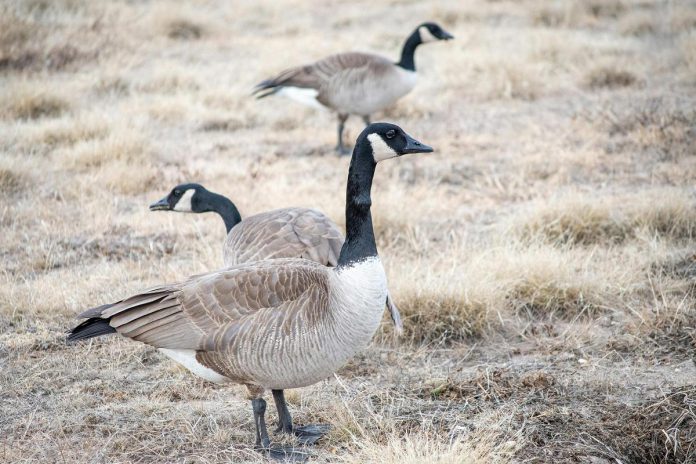The Haliburton, Kawartha, Pine Ridge (HKPR) District Health Unit is reminding the public to be cautious around wild birds and adhere to recommended safety precautions after a Canada goose in Cobourg was confirmed to be infected with bird flu.
Between January 3 and 6, there were reports of a large die-off of geese and ducks in the Cobourg harbour area, and it is believed the die-off was a result of avian influenza. A Canada goose found in the harbour on January 3 was submitted for testing and was subsequently confirmed by the Canadian Wildlife Health Cooperative to be infected with bird flu.
Although the risk of transmission to humans is very low since the birds were found in an open environment and there are no remaining dead birds at the site, the health unit is reminding people to be cautious and adhere to recommended safety precautions if interacting with wild birds.
“As of now, there have been no confirmed human cases of avian influenza within our district area and we anticipate that this trend will continue,” says HKPR District Health Unit medical officer of health Dr. Natalie Bocking in a media release.
“It’s important for everyone to understand the risks avian influenza poses, not only to wild and domestic bird populations but also to human health. We will continue to monitor the situation, and we urge residents to take all necessary precautions to protect both themselves and animals during this time.”
Avian influenza is a viral disease that affects mostly domestic poultry and wild birds such as geese, ducks, and shore birds. Each year, there is a bird flu season, and some forms of bird flu are worse than others.
To date, the most common avian influenza virus in domestic birds in Canada has been the highly pathogenic avian influenza (HPAI), subtype H5N1, which is known to kill both wild birds and commercial poultry. It can also infect dairy cattle and other livestock. Although HPAI was confirmed in dairy cows in the U.S. for the first time in 2024, H5N1 virus has not been detected in cattle, other livestock animals, or dairy products in Canada.
This is not the first time H5N1 has been confirmed in the Kawarthas. In April 2022, H5N1 was confirmed in a backyard flock of chickens in Selwyn Township. In April 2023, a pet dog in Oshawa died after contracting bird flu from chewing on a dead goose — the first documented case of its kind in Canada.
Humans and other mammals can only become infected with bird flu after prolonged close contact with infected birds. There is no evidence that properly cooked poultry, eggs, or beef would transmit HPAI to humans. Pasteurized cow’s milk and milk products remain safe to consume.
To minimize the risk of exposure to bird flu, the health unit encourages residents to follow the precautions listed below.
- Avoid direct contact with ill or dead wild birds and animals. If handling is necessary, wear proper personal protective equipment (gloves, mask, and eye protection), place the animal in two sealed plastic bags, and wash hands thoroughly after contact.
- Follow safe cooking guidelines when preparing poultry and eggs. Always cook poultry to an internal temperature of 74°C (165°F) to ensure safety from potential pathogens. Do not handle or eat any animals that appear to be sick or that have died from unknown causes.
- Keep pets indoors or on leashes when outside to prevent them from coming into contact with wild birds, including waterfowl, to reduce the risk of exposure.
- Hunters and trappers should also be careful when handling wild birds and some mammals, especially when field dressing, plucking and cleaning game. Following biosecurity measures and safe handling and cleaning guidelines such as wearing rubber gloves, using a well-ventilated area and washing your hands and surfaces, can drastically reduce your risk of exposure to avian influenza.
Residents should report sick or dead wildlife to the Canadian Wildlife Health Cooperative at 1-800-567-2033 or online at cwhc.wildlifesubmissions.org/.
For more information on avian influenza, visit hkpr.on.ca/avianflu or www.peterboroughpublichealth.ca/avian-influenza/.



























